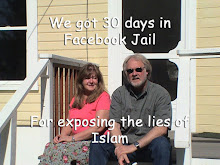EASTERN GATE CLOSED UNTIL FURTHER NOTICE!
Around 575 B.C. Ezekiel prophesied of the Jewish temple gate in Jerusalem being closed. The Eastern Gate of the temple in Jerusalem was first sealed in 810 by Muslims. It was reopened in 1102 for a short time by the Crusaders. It was walled up again by Ottoman leader Saladin 1187 when he captured the city. Later Suleiman the Magnificent rebuilt the walls and the gate remains closed to the present day.
Thinking the Messiah would not walk through a cemetery because he would be defiled the Muslims have placed a grave yard in front of the gate to stop any such thing. Jesus is the resurrection however and he is not likely much concerned with such trivia.
Augustine spiritualized Ezekiel 44:2 and applied it to the perpetual virginity of Mary to support Catholic tradition. Some reformers have endorsed this questionable theory as well. Augustine also promoted the replacement idea that God had replaced Israel with the church. That was a popular theory until it was debunked by God in 1948 when Israel became a nation again against all odds.

While the word Palestine does not appear in the New Testament it does appear four times in the Old Testament, but only in the King James. It is actually a poor translation which is corrected in new versions. The land of the Philistines, where the word originated, was always considered to be the enemy of the Jews. In Isaiah 14:29-31 Philistia is judged by God.
Jerusalem...a cup that causes reeling to all the peoples(Zechariah 12:2)



